5G NR Frame Structure
Let’s Have a look on 5g NR(New Radio) Frame Structure.
NOTE : All Images are copyrighted material. We used them here , only for fair use . No Copyright infringement intended.

Introduction
In 5G NR , each frames has a time durations of 10 ms and frame are nothing but one segment of the data which is intend to send from sender(source) to receiver(destination).
Now , each frame compromises of 10 subframes , which gives us the duration of each subframe which is about 1 ms.
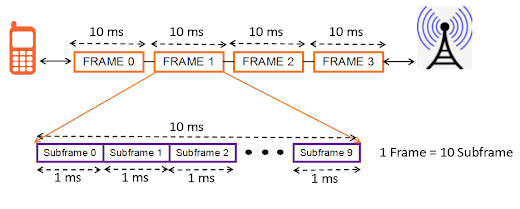
After frame are divided into subframe , now each subframe are divided into slots , whose number is depend on the numerology formula (2^µ) and µ has a range from zero to four .
Lets have a look what does it really mean.
As slots number are depend on the 2^µ and if we take µ’s value as zero, we get 2^µ as 1, this means here each subframe divided into one slot . Similarly for µ’s value as 1, we get 2^µ as 2,now each subframe divided into two slots . Same procedure for the rest µ’s value.
Below image give you a diagrammatic overview about what we have discussed above.
For the sake, only see the first column and last column of the table describing about number of slots depend on value of µ.
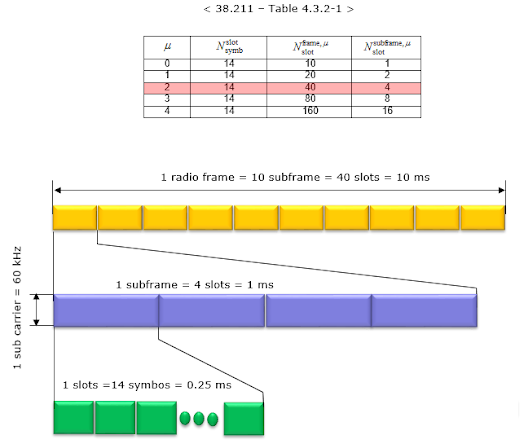
Here we can see from the table in the image that for different value of µ, we get different number of slots in each subframe . The green three dots in the slots part shown , describing that it can be vary according to the value of µ .
In the image , we has taken a random value of µ as 2 and after applying in th formula 2^µ, we get number of slots in each subframe as 4.
Now as each subframe its of 1ms time duration now if each subframe divided into 1 slot for µ value zero ,then slot has also its time duration of 1 ms. For 2 slots (µ value as one) , time duration of subframe (1 ms) divided into 2 slot as 0.5 ms for each slot in each subframe .
Here in the image above , as each subframe is divided into 4 slots for µ value as 2 now the time duration of subframe (1 ms) is divided into 4 slots and give rise to 0.25 ms time for each slot in each subframe .
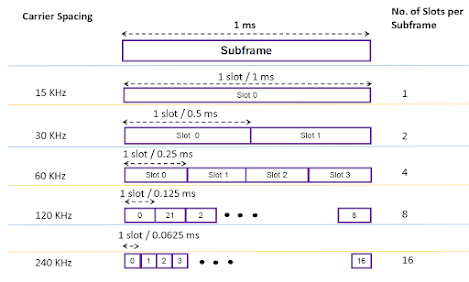
Now each slots has some symbols depend on cycle prefix , so to understand it we have to first read what is cycle prefix.
CYCLE PREFIX : Cycle Prefix refers to the prefixing of a symbol , with a repetition of the end in OFDM.
OFDM:
Orthogonal frequency division multiplexing means to transmit data ,data is split up into several closely spaced narrowband subchannel frequency instead of a single wideband channel frequency .
For its clear understanding , OFDM simply means to divide the channel into subchannels which are independent of each other and transmits them orthogonally(parallel) to each other, for making their transmission faster.
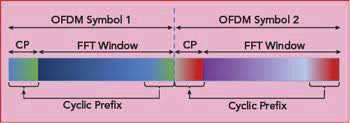
Cycle Prefix are of two types:
- Normal Cycle prefix (NCP) : This prefix is used in the scenarios to support propagation conditions with a delay spread upto of 4.7 microseconds(µs).
- Extended Cycle prefix (ECP) : This prefix is intended to support deployments where the delay spread is upto 16.7 microseconds(µs). Reference
In Normal Cycle prefix, there are 14 symbols in each slot and 12 with Extended Cycle prefix.
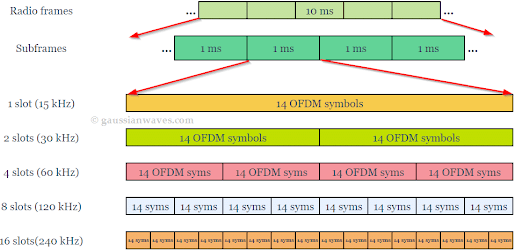
Now lets have a look on some terms :
Subcarrier Spacing : In NR , there are multiple subcarrier spacing as there is numerology .
Subcarrier Spacing =(2^µ)*15KHz.
This is clearly understandable from the below image that when we have taken µ value as 0 we get SCS(subcarrier Spacing) as 15KHz.
The subcarrier spacing is the spacing which is shown in the below diagram through by drawing different subcarrier for different value of µ. These Subcarrier are inside of the symbols .
The narrow subcarrier allows better equalization and therefore enhanced channel robustness.
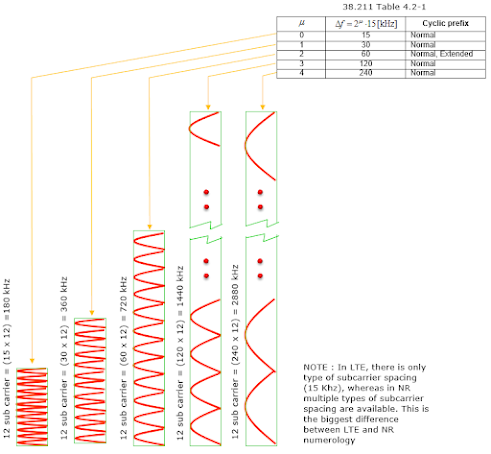
Resource Grid : A resource grid is characterised by one subframe in the time domain and full carrier bandwidth in the frequency domain.
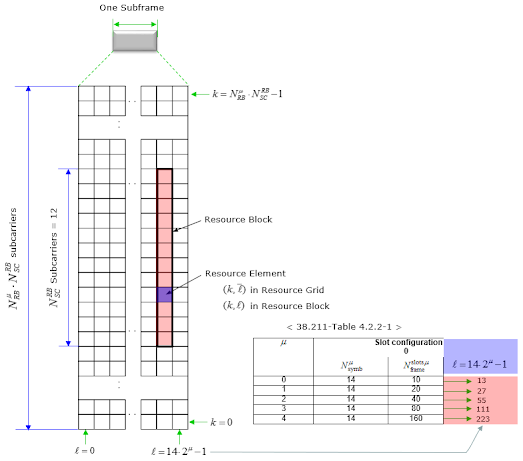
Now , have a look on the above image as you can see there is one subframe at above .Suppose this is a case when µ value is zero , so number of slots are(2^µ ), which is 1. So now one subframe divided into one slot and one slot into 14 symbols for NCP (Normal Cycle Prefix).
So , in this image this is directly shown that one subframe compromises of 14 symbols in the x-axis domain(time domain) and in the y-axis this is the bandwidth of the channel.
Now 12 consecutive subcarriers in the y-axis domain resulted into Resource Block.
Each Symbols is the resource element . k and l are the terms used to describe the time domain and bandwidth(frequency) domain respectively.